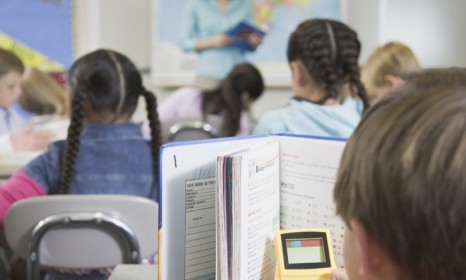U.S. students' 'alarming' history scores: 5 takeaways
In a nationwide test, only 12 percent of America's high school seniors demonstrated proficiency in history. How has it come to this?

A free daily email with the biggest news stories of the day – and the best features from TheWeek.com
You are now subscribed
Your newsletter sign-up was successful
"Don't know much about history," Sam Cooke sang in his 1960 hit "Wonderful World," unaware just how prescient his lyrics were. According to the latest results of a nationwide test on American history, just 20 percent of fourth graders, 17 percent of eight graders, and 12 percent of high school seniors tested at a proficient level. What should we make of this "alarming" report card? Here, five possible lessons:
1. Blame No Child Left Behind
Everyone's favorite education scapegoat is being flogged once again, with history advocates saying the 2002 law's focus on raising math and reading scores came at the expense of other subjects, especially history. "History is very much being shortchanged," says Linda K. Salvucci, a professor of history and the chairwoman-elect of the National Council for History Education, as quoted by The New York Times.
The Week
Escape your echo chamber. Get the facts behind the news, plus analysis from multiple perspectives.

Sign up for The Week's Free Newsletters
From our morning news briefing to a weekly Good News Newsletter, get the best of The Week delivered directly to your inbox.
From our morning news briefing to a weekly Good News Newsletter, get the best of The Week delivered directly to your inbox.
2. It's also teachers' fault
Not enough teachers are focusing on history when it comes to their own training, Salvucci says. They're being encouraged to get certifications in broad areas like social studies. "They think they'll be more versatile, that they can teach civics, government, whatever," she says. "But they're not prepared to teach history."
3. Our ignorant politicians are no better than these kids
The shoddy historical knowledge displayed by prominent politicians isn't helping matters, and it's sending a bad message to students about the importance of studying history, says Jim Grossman, executive director of the American Historical Association, as quoted by The Huffington Post. Headline-grabbing kerfuffles abound — see Sarah Palin's disputed take on Paul Revere, or Michele Bachmann's erroneous Revolutionary War geography. "I'd like to see the full Congress take the test."
A free daily email with the biggest news stories of the day – and the best features from TheWeek.com
4. The report has some good news, too
Among the few bright spots: At all grade levels tested, the lowest performing students — those in the bottom 10th percentile — scored better than they had in 2006. And at the fourth and eight grade level, the "racial achievement gap" between the scores of white students and those of black and Hispanic students narrowed.
5. But the 12th graders' scores are especially troubling
The 12th graders' test scores are "particularly worrisome," because those students will be able to vote in the 2012 elections, says the The Christian Science Monitor in an editorial. "Americans put themselves at the mercy of political spin if they don't understand the currents of their history."
-
 Quentin Deranque: a student’s death energizes the French far right
Quentin Deranque: a student’s death energizes the French far rightIN THE SPOTLIGHT Reactions to the violent killing of an ultra-conservative activist offer a glimpse at the culture wars roiling France ahead of next year’s elections.
-
 Secured vs. unsecured loans: how do they differ and which is better?
Secured vs. unsecured loans: how do they differ and which is better?the explainer They are distinguished by the level of risk and the inclusion of collateral
-
 ‘States that set ambitious climate targets are already feeling the tension’
‘States that set ambitious climate targets are already feeling the tension’Instant Opinion Opinion, comment and editorials of the day